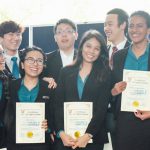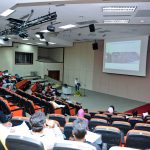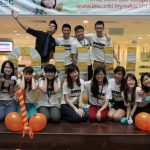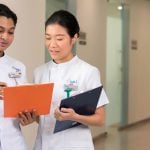During my final year in the IMU Medical Biotechnology programme, I had an opportunity to do my internship with Dr Danielle Anderson from Emerging Infectious Disease (EID), DUKE-NUS in Singapore. Dr Danielle Anderson is the Scientific Director of the Duke-NUS Medical School ABSL3 laboratory and her research interests include understanding the virus/host relationship of a diverse group of medically important negative-stranded RNA viruses that includes Measles virus, Mumps virus and Nipah virus. Besides, Dr Anderson utilises novel diagnostic platforms for the identification of not only new paramyxoviruses but also other clinically relevant emerging infectious diseases, such as MERS and Zika virus. I decided to do my internship in EID because EID conducts world-class research covering all major areas of emerging infectious diseases from pathogen discovery, novel diagnostics, molecular pathogenesis, immunology to experimental therapeutics, clinical trials of vaccine and therapeutics, and global health and one health research. During my 6-month internship with Dr Danielle Anderson, I was involved in a few projects such as the drug toxicity study, SiRNA transfection study and Dengue virus pathogenesis in a monkey. This internship inculcated many pragmatic accomplishments in me. As a result, I am acquired skills such as PBMC and plasma isolation, cultivation of virus, virus titration, ELISA, NGS library prep, western bolt, cDNA synthesis, PCR, gel electrophoresis, RNA/ DNA extraction from gel and siRNA transfection. When I first moved from university studies into research, the biggest shock to me was failures. Throughout my degree, I had spent years going back home satisfied having completed my practical session, submitted reports and delivered my presentation slides. Now, I could do days of work and yet see no result. I used to get frustrated and upset when the result is not what I had expected. However, I was lucky to be in a group where failure was discussed, and resilience was encouraged. My supervisor and research assistant had encouraged me to try new techniques and think in new and different ways.
Besides, the soft skills that I had acquired in IMU during my final year project (FYP) such as decisiveness, problem-solving, team-work and time management skills had played an important role in overcoming all the challenges I faced during my internship. I had gained a lot of lessons from these failures and hard times, including precision and the importance of aseptic techniques.
Moreover, one of the biggest challenges I face during my internship was to work and communicate with the great, versatile, and diverse employees in EID. In EID, I got to work with people from different backgrounds and countries. This gave me a new perspective into how important is English especially with people from different countries and cultures. I can’t say enough about how IMU as an English-speaking campus had prepared me well for my internship.
| My Experience Studying IMU Medical Biotechnology Programme |
|---|
| IMU Medical Biotechnology programme had also equipped me well with the knowledge that covers a broad spectrum of topics as well as practical skills. Furthermore, IMU had also provided me with substantial experience in working as a team and communicating with people at all levels across disciplines within organisations. My FYP in IMU had also familiarised me with the steps involved in developing a research project, from the initial motivating ideas to a rough design, design of materials, pilot studies, draft final design, tuning of parameters, and execution of the experiment. I entered IMU almost exclusively interested in microbiology. My coursework and research experience at IMU not only have increased my interest in microbiology but has also strongly shaped my interest in infectious disease. Infections contribute importantly to the overall disease burden and mortality worldwide. I think that a more thorough understanding of how these agents cause disease and how the human immune system responds to these infections is paramount in saving lives globally as it plays an important role in the development of new treatment, prevention, and control strategies. |
Written and photos by Chong Ce Lynn.









